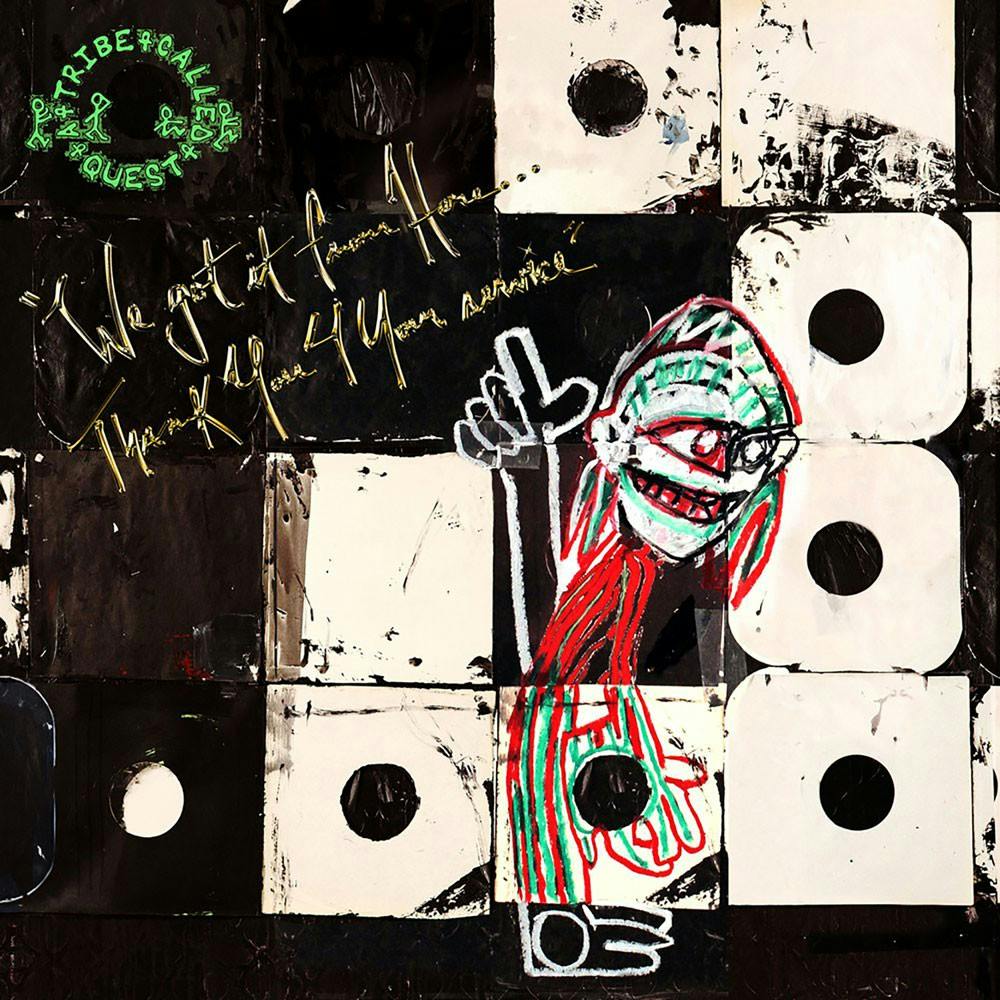Album: We Got It from Here... Thank You 4 Your Service
Artist: A Tribe Called Quest
Label: Epic Records/Sony Music Entertainment
Release: November 11
Grade: A-
The hip-hop community mourned the loss of one of its most celebrated rhymers on March 22, 2016. Phife Dawg, longtime rapper for the hip-hop group A Tribe Called Quest, had died from diabetic-related issues.
Phife Dawg, remembered as one of the pioneers of alternative rap, lives on in ATCQ’s latest release We Got It from Here…Thank You 4 Your Service. The album is packed with verses from the late rapper as well as fellow group members Q-Tip, Ali Shaheed Muhammad and Jarobi White.
The album’s title was suggested by Phife Dawg before his untimely death. The meaning behind the title has been lost but the group’s decision to use the title proves their goal to memorialize the rap legend.
The two-disc album dropped in the wake of a historical election. It features eloquently crafted tracks in response to America’s changing political scene throughout.
On the song “We the People…,” ATCQ plays with the rhetoric of president-elect Donald Trump over a harsh beat. Q-Tip satirically asks on the hook for oppressed groups such as gay people and Muslims to leave the country.
Phife Dawg adds on the bridge that the media “logs false narratives of gods that came up against the odds.” The song is a result of dropping at just the right time, brilliantly capturing the feelings of America’s disenfranchised population.
Elsewhere, the group’s collective voice resonates with those still in awe over the election. On the song “Conrad Tokyo,” Phife Dawg raps about the “troublesome times” and criticizes how Americans view Donald Trump as a joke rather than a serious threat.
Rapper Kendrick Lamar is also featured on the song. In his verse, Lamar touches on Americans’ “toleration for devastation” while spitting over a spacey, jazz-like beat.
Other featured artists act as tour guides for the album’s meaningful content. On the song “The Killing Season,” rapper Talib Kweli compares the struggle that Black people face in America to soldiers at war. Kanye West is on the chorus and the song is a soulful reminder that the fight against racism continues.
Not only do musical contributors add weight to ATCQ’s message, they also emit their individuality.
On “Kids…,” Outkast member Andre 3000 drops a lyrically loaded verse delivered with his signature effortless flow. On “Movin Backwards,” multi-talented soul singer Anderson Paak blends his uniquely raspy voice over guitar-led instrumentation.
One of the album’s standout moments includes rapper Busta Rhymes’ high-energy feature on “Mobius.” Rhymes slaughters the mic and unleashes a spoken force that he hasn’t yet exhibited in his tired, later career.
Rhymes is also featured on the album’s last track “The Donald.” The track is a tribute to Phife Dawg and features an ill, distorted guitar outro.
The 16-song album is interestingly packed with eccentric samples as well. Everything from Elton John’s “Rocket Man” to clips from ‘70s Blaxploitation film “Willie Dynamite” is used on the album.
On “The Space Program,” an audio bit from the movie “Willy Wonka & the Chocolate Factory” is used to close the track.
In the clip, Wonka states, “the danger must be growing,” and the rowers are “not showing any signs that they are slowing.” The sample is used to draw a comparison to the political “danger” that ATCQ perceive as they take the role of the rowers who have something to say about it.
The samples compliment the album’s groovy selection of beats produced by Q-Tip. Cuts like “Black Spasmodic” and “Dis Generation” present an old school-like method of instrumentation.
Production on the album is run by an onslaught of reverberating bass and strong drums. Q-Tip reveals his genius and doesn’t shy away from the aesthetic that made ATCQ famous.
The group’s jazz rap sound has been highly regarded by modern hip-hop stars such as Pharrell Williams and Kanye West.
ATCQ’s The Low End Theory and Midnight Marauders were evolutionary to the construction of hip-hop in the ‘90s. Songs off of the new album like “The Space Program” and “Mobius” are indistinguishable from songs recorded during ATCQ’s peak.
Additionally, the track “Enough!!” brings back memories for longtime fans of the group. The track samples soul band Rotary Connection’s “Memory Band,” which was used on ATCQ’s classic song “Bonita Applebum.”
In the past, as members of the ‘90s hip-hop collective the Universal Zulu Nation, they used their music as an outlet from issues facing the Black community. Today, their age has proven that they have garnered a more direct approach to their political ideals.
Though the album’s first disc lacks the vibrant punch that the second disc provides, A Tribe Called Quest provides a much-needed message in the form of a renewed style.
Benjamin Blanchet is a staff writer and can be reached at arts@ubspectrum.com

Benjamin Blanchet is the senior engagement editor for The Spectrum. His words have been seen in The Buffalo News (Gusto) and The Sun newspapers of Western New York. Loves cryptoquip and double-doubles.





